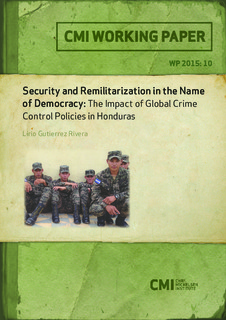| dc.contributor.author | Rivera, Lirio Gutierrez | |
| dc.date.accessioned | 2018-01-04T08:20:37Z | |
| dc.date.available | 2018-01-04T08:20:37Z | |
| dc.date.issued | 2015-09-01 | |
| dc.identifier | oai:www.cmi.no:5635 | |
| dc.identifier.citation | Bergen: Chr. Michelsen Institute (CMI Working Paper WP 2015:10) 23 p. | |
| dc.identifier.isbn | 82-8062-556-4 | |
| dc.identifier.issn | 0804-3639 | |
| dc.identifier.uri | http://hdl.handle.net/11250/2475126 | |
| dc.description.abstract | During the past decade, the Honduran government has introduced hard-line security policies in order to reduce the alarming levels of crime and delinquency in the country. This CMI Working paper outlines the history of civil-military relations as characterized by a string of military dictatorships in the 20th century, followed by an analysis of the impact of contemporary security policies, known as Mano Dura (Iron Fist). The analysis shows that these policies have led to the gradual militarization of certain sectors of society, especially the poor urban neighborhoods where police and military carry out raids and arrests. The Working Paper concludes that the military still holds significant political power in Honduras. | |
| dc.language.iso | eng | |
| dc.publisher | Chr. Michelsen Institute | |
| dc.relation | CMI Working Paper | |
| dc.relation | WP 2015:10 | |
| dc.relation.ispartof | CMI Working Paper | |
| dc.relation.ispartofseries | CMI Working Paper WP 2015:10 | |
| dc.relation.uri | https://www.cmi.no/publications/5635-security-and-remilitarization-in-the-name-of | |
| dc.subject | Military | |
| dc.subject | Civil-Military Relations | |
| dc.subject | Security Politics | |
| dc.subject | Honduras | |
| dc.title | Security and remilitarization in the name of democracy: The impact of global crime control policies in Honduras | |
| dc.type | Working paper | |
